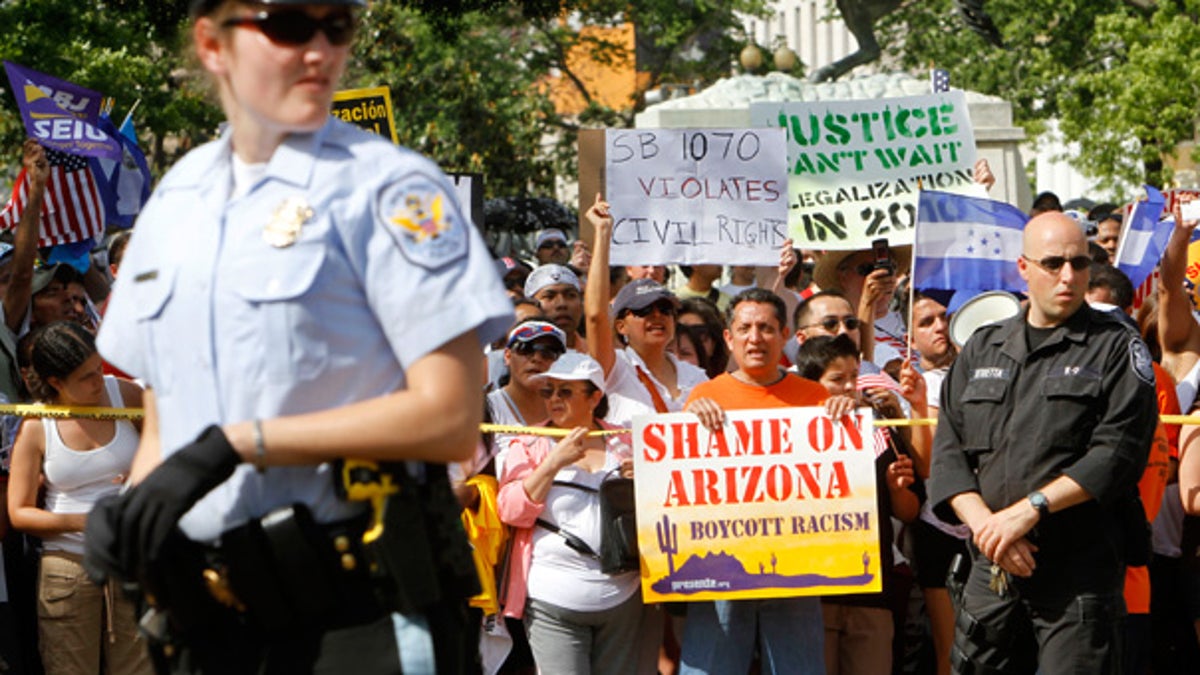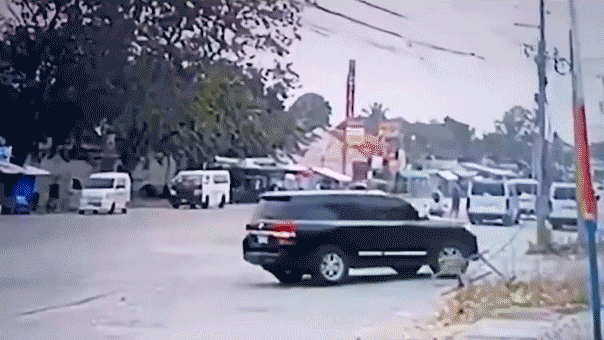
May 1: Protesters hold signs against Arizona's tough new immigration law, near the White House.
NOGALES, Mexico — The line of Mexicans waiting to go shopping in Arizona snakes twice around the sun-drenched plaza, even as politicians nearby slap stickers on cars calling for a boycott of the U.S. state.
And the illegal migrants targeted by a tough new Arizona law dismiss it as just another obstacle that pales in comparison to the extortion, arrests and kidnappings they already risk to reach U.S. soil. They vow to keep on coming.
Resentment has erupted throughout Mexico over the immigration law in Arizona that is considered racist here. But crossing back and forth between the countries is so intrinsic to their lives that many Mexicans find it hard to give it up despite calls by immigration activists for a boycott of Arizona.
"Border cities depend on each other and it has been that way for many years," said Maria Romero, a nurse from Nogales, which lies across from the Arizona town of the same name. "It seems they don't understand that on the other side and are always looking for ways to make things more difficult."
There are few signs so far that the bill has deterred Mexicans from crossing into Arizona — legally or not. The wait to drive across the border is more than two hours.
The legislation signed by Arizona Gov. Jan Brewer last week requires local and state police who stop people for another reason to question them about their immigration status if there's reason to suspect they're in the country illegally. Suspects would be detained if they are not carrying proper documents.
Supporters say the law is necessary because the federal government has failed to secure the border and because of rising anxiety over crime.
The measure has provoked huge protests in the United States by immigrant advocates who say it will encourage racial profiling. But the outcry south of the border has been subdued as Mexicans wait for the law to take effect and see how it will be implemented.
Some Mexican officials even warn that an economic boycott of Arizona could backfire if companies there lay off Mexican workers who would then no longer be able to send remittances back home.
For many of the tens of thousands of Mexicans who legally visit Arizona every day to shop for bargains or visit relatives, the cost of not going is too high — despite their dislike of the law.
In Nogales, Mexico, Romero lined up with hundreds of others at the border crossing, inching forward around a plaza and past vendors hawking jewelry and cheap souvenirs. She needed to buy a tuxedo for her 5-year-old son to wear to his kindergarten graduation and hoped to find it for a third of what it would cost in Mexico.
"No one should cross, but we go because we want to save," Romero said.
Life in the two cities is tightly interwoven despite the corrugated steel wall that runs along the hillsides, separating a string of fast-food restaurants and cheap clothing stores on the U.S. side from the dusty streets and nightclubs to the south.
The Mexican city, founded in the 19th century along a north-south railway line built to promote trade between the two countries, has become the largest point of entry for the estimated 65,000 Mexicans who visit Arizona every day, mostly for the big shopping malls.
At least 23,400 jobs in Arizona depend on the more than $7.35 million that Mexican visitors spend every day in stores, restaurants, hotels and other businesses, according to a University of Arizona study sponsored by the state's Office of Tourism.
In Santa Cruz county — where Arizona's Nogales is located — Mexican visitors account for 50 percent of taxable sales, the research found.
Mexicans angry about the immigration law want to deprive Arizona of that income.
The Institute for Mexicans Abroad, an autonomous government agency that supports Mexicans living and working in the United States, called for boycotts of Tempe, Arizona-based US Airways, the Arizona Diamondbacks and the Phoenix Suns until those organizations denounce the law.
Mexican legislators of all political stripes have called on the government of President Felipe Calderon to consider breaking commercial ties with Arizona. The government has issued a travel alert for the state, warning that migrants face an adverse political environment there.
A group of politicians handed out stickers at the Nogales border crossing over the weekend, urging Mexicans not to buy Arizona products.
"Made in Arizona SB 1070. I don't buy from those who discriminate," the stickers read, in reference to the bill.
The movement has yet to take off.
Nogales Mayor Jose Angel Hernandez said many Arizona shops, business and factories employ Mexicans who send money back to relatives south of the border.
"I have family in Nogales, Arizona, and I have a lot of friends who live and work there, and they help Nogales, Sonora," Hernandez said in an interview with The Associated Press. "That's why I worry that if the boycott is not directed correctly, it could harm our Mexican brothers who are there and are helping us."
At a shelter in Nogales, meanwhile, deported migrants discussed how soon they could get back across the border.
"I'll return to Arizona because I know a lot of people there, and I'll go where people will give me work, law or no law," said Nicasio Benitez, who worked in landscaping there until he was deported last week after being caught in a car with a cracked windshield.
He said he would visit family in the Gulf coast state of Veracruz before heading back to the border in a month.
"You live under a lot of pressure in Arizona. You have a hard time finding a place to rent, being able to drive," said Benitez, a father of three teenagers. "But what you make in the U.S. in one day, you make it in Mexico in one week."
"Life there is awful, but I don't go to the U.S. because I like living there," he added. "I go because I like dollars."








































